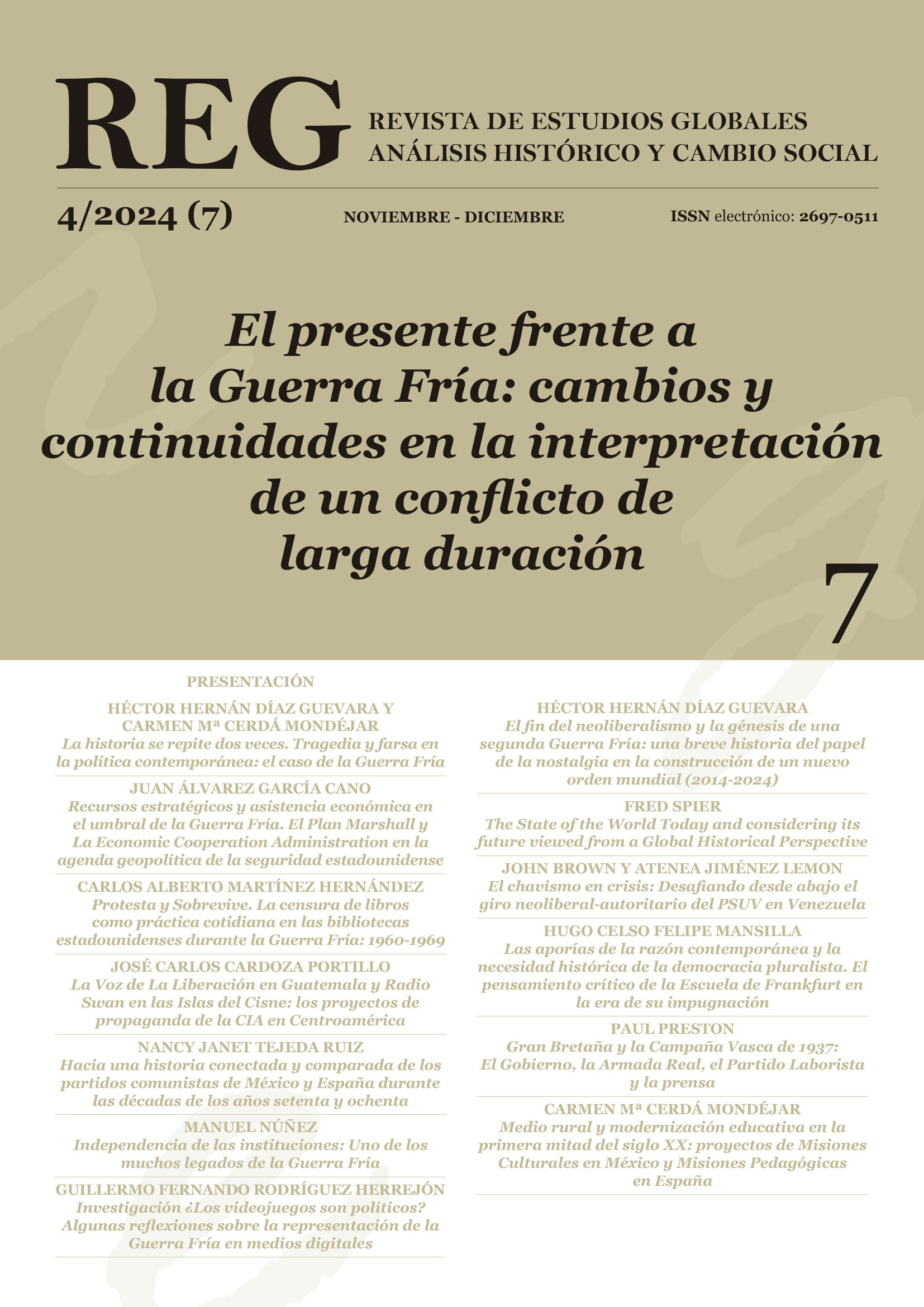The State of the World Today and Considering its Future Viewed from a Global Historical Perspective
Resumen
This article discusses the state of the world and its possible future seen from a global socio-ecological point of view. All our global changes can be described as processes that take place within the biosphere, the thin outer layer of Earth. Departing from William H. McNeill’s book The Pursuit of Power of 1982 it is argued that all human processes are driven by this pursuit, even though not all humans are pursuing power all the time. This is demonstrated by discussing two current violent conflicts: Palestine / Israel and Ukraine. Subsequently, major global trends are discussed, followed by an analysis of what the future may bring. Even though many specific processes can be forecast with some degree of reliability, the future as a whole is inherently unpredictable because there are too many interactions, many resulting from chance effects, while others are small yet with potentially large effects that may or may not happen. By further developing our theoretical model of society using the sociology of Norbert Elias as a starting point, it may be possible to formulate a general paradigm of human behavior for the humanities and the social sciences, in doing so seeking to produce more reliable knowledge of ourselves and our history as inhabitants of planet Earth.
Descargas
Métricas
-
Resumen193
-
pdf 198
Citas
Alvarez, Walter. 2016. A Most Improbable Journey: A Big History of Our Planet and Ourselves.
New York, W.W. Norton & Company.
Crosby, Alfred W. 1972. The Columbian Exchange: Biological and Cultural Consequences
of 1492. Westport, CT, Greenwood Press.
Belmaker, Miriam, Tchernov, Eitan, Condemi, Silvana & Bar-Yosef, Ofer. 2002. ‘New
evidence for hominid presence in the Lower Pleistocene of the Southern Levant’.
Journal of Human Evolution. 43, 1 (July), pp.43-56.
Crosby, Alfred W. 1993. Ecological Imperialism: The Biological Expansion of Europe, 900–
Cambridge, Cambridge University Press.
Crosby, Alfred W. 1997. The Measure of Reality: Quantification and Western Society,
–1600. Cambridge, Cambridge University Press.
Crosby, Alfred W. 2006. Children of the Sun: A History of Humanity’s Unappeasable Appetite
for Energy. New York, W. W. Norton & Co.
Darwin, Charles. 1859. On the Origin of Species by Means of Natural Selection, or the
Preservation of Favoured Races in the Struggle for Life. London, John Murray.
Elias, Norbert. 1975. Lessons in sociology (video). YouTube: https://www.youtube.
com/watch?v=89nb0RYbI2g
Elias, Norbert. 1978. What is Sociology? London, Hutchinson.
Elias, Norbert. 2010. Sociología fundamental. Barcelona, Gedisa.
Elias, Norbert. 1987. ‘The Retreat of Sociologists into the Present.’ Theory, Culture &
Society 4 , 2–3 ( 213–22 ).
Elias, Norbert. 1987. Involvement and Detachment. Oxford, Basil Blackwell.
Elias, Norbert. 2002. Compromiso y Distanciamiento. Barcelona, Ediciones Península
Elias, Norbert. 1992. Time: An Essay. Oxford, Basil Blackwell.
Elias, Norbert. 2010. Sobre el tiempo. Madrid, Fondo de Cultura Económica.
Elias, Norbert. 1994. The Civilizing Process. Oxford, UK & Cambridge, USA, Blackwell.
Elias, Norbert. 2011. El Proceso de Civilización. Madrid, Fondo de Cultura Económica
de España.
Elias, Norbert & Scotson, John L. 1994. The Established and the Outsiders: A sociological
enquiry into community problems. London, Sage Publications.
Elias, Norbert. 2016. Establecidos y Marginados: Una investigación sociológica sobre problemas
comunitarios. Madrid, Fondo de Cultura Económica.
Howitt-Marshall, Duncan & Runnels, Curtis. 2016. ‘Middle Pleistocene sea-crossings
in the eastern Mediterranean?’ Journal of Archaeological Anthropology 42, pp. 140-53.
Howe, Richard Herbert. 1978. ‘Max Weber’s Elective Affinities: Sociology Within theBounds of Pure Reason.’ American Journal of Sociology 84, 2 (Sep., 1978), pp. 366-85.
Kuhn, Thomas S. 1970. The Structure of Scientific Revolutions, 2nd edition, enlarged. Chicago,
University of Chicago Press (1962).
Kuhn, Thomas S. 2006. La Estructura de las Revoluciones Cientificas, Nueva Edición. Madrid,
Fondo de Cultura Económica de España.
McNeill, J. R. 2000. Something New Under the Sun: An Environmental History of the
Twentieth Century World. London, Penguin Books.
McNeill, John. R. 2011. Algo Nuevo Bajo El Sol: Historia Medioambiental Del Mundo en
el Siglo XX. Alianza Editorial.
McNeill, John R. 2010. Mosquito Empires: Ecology and War in the Greater Carribean,
-1914. Cambridge, Cambridge University Press.
McNeill, John Robert & Engelke, Peter. 2016. The Great Acceleration: An Environmental
History of the Anthropocene since 1945. Cambridge, MA, The Belknap Press.
McNeill, John R. 2024. The Webs of Humankind: A World History (Volume 1 & 2). W. W.
Norton & Company; Seagull Second edition.
McNeill, William H. 1963. The Rise of the West: A History of the Human Community.
Chicago & London, University of Chicago Press.
McNeill, William H. 1974. Venice: The Hinge of Europe, 1081-1797. Chicago & London,
University of Chicago Press.
McNeill, William H. 1974. The Shape of European History. New York, London, Toronto,
Oxford University Press.
McNeill, William H. 1976. Plagues and Peoples. Garden City, N.Y., Anchor Press /
Doubleday.
McNeill, William H. 2016. Plagas y Pueblos. Siglo XXI de España Editores, S.A.
McNeill, William H. 1984. The Pursuit of Power: Technology, Armed Force and Society
since AD 1000. Chicago, University of Chicago Press (1982).
McNeill, William H. 1989. La Búsqueda Del Poder: Tecnología, fuerzas armadas y sociedad
desde el 1000 d.C. Madrid, Siglo XXI.
McNeill, William H. 1984. ‘Migration in historical perspective.’ Population and Development
Review 10, 1 (March), pp.1-18.
McNeill, William H. 1991. The Rise of the West: A History of the Human Community, with
a Retrospective Essay. Chicago & London, University of Chicago Press.
McNeill, William H. 1998. The Disruption of Traditional Forms of Nurture: Essay and
Discussion. Amsterdam, Het Spinhuis.
McNeill, John R., and McNeill, William H. 2003. The Human Web: A Bird’s-Eye View ofWorld History. New York, W. W. Norton & Co.
McNeill, John R. y McNeill, William H. 2010. Las Redes Humanas: Una Historia Global
del Mundo. Barcelona, Editorial Crítica.
Persson, Lynn, et al. 2022. ‘Outside the Safe Operating Space of the Planetary Boundary
for Novel Entities.’ Environmental Science & Technology 56 (3), pp.1510-1521. DOI:
1021/acs.est.1c04158
Service, Robert F. 2024. ‘Leading scientists urge ban on developing ‘mirror-image’
bacteria.’ Science, 12 December: https://www.science.org/content/article/leading-
scientists-urge-ban-developing-mirror-image-bacteria
Spier, Fred. 1994. Religious Regimes in Peru: Religion and state development in a longterm
perspective and the effects in the Andean village of Zurite. Amsterdam, Amsterdam
University Press.
Spier, Fred. 1995. San Nicolás de Zurite: Religion and Daily Life of an Andean Village in a
Changing World. Amsterdam, VU University Press.
Spier, Fred. 1996. The Structure of Big History: From the Big Bang until Today. Amsterdam,
Amsterdam University Press.
Spier, Fred. 1998. ‘La teoría del proceso de la civilización de Norbert Elias nuevamente
en discusión: Una exploración de la emergente sociología de los regímenes.’ En: Vera
Weiler (compiladora) Figuraciones en proceso. Bogotá, Colombia, Fundación Social,
Universidad Nacional de Colombia, Universidad Técnica de Santander, pp.257-298.
Spier, Fred. 1999. ‘Структура Большой истории’ (The Structure of Big History).
Общественные науки и современность (Social Sciences and Modernity), 5, pp.152-63,
Moscow, Russian Academy of Sciences.
Spier, Fred. 2005a. `What Drives Human History ? A View from Big History’ (extended
version) ФИЛОСОФСКИЕ НАУКИ (Philosophical Sciences), Organ of the Russian
Ministry of Education, 2, pp.19-38, and 3, pp.50-58.
Spier, Fred. 2005b.`Big History: Interdepartmental Course in World and Human History.’
ФИЛОСОФСКИЕ НАУКИ (Philosophical Sciences), Organ of the Russian Ministry
of Education, 11, pp.89-110.
Spier, Fred. 2005c. `How Big History Works: Energy Flows and Rise and Demise of Complexity.’
Social Evolution & History 4, 1, pp.87-135. Moscow: `Uchitel’ Publishing House.
Spier, Fred. 2006. «Why Big History?”Philosophskiye Nauki (Philosophical Science),
Organ of the Russian Ministry of Education, 8, pp.104-106.
Spier, Fred. 2010. Big History and the Future of Humanity. Oxford, U.K., Malden, MA,
Wiley-Blackwell.
Spier, Fred. 2011. El lugar del hombre en el cosmos: La Gran Historia y el futuro de la humanidad.
Barcelona, Editorial Crítica.
Spier, Fred. 2015. Big History and the Future of Humanity, Second Edition. Oxford, U.K.,Malden, MA, Wiley-Blackwell.
Spier, Fred. 2022. How the Biosphere Works: Fresh views discovered while growing peppers.
Boca Raton, Fl., The CRC Press.
Spier, Fred. 2022. The State of Our World Today (March 11) http://www.bighistory.
info/bhi_005_041.htm
Spier, Fred. 2023. La gran historia y sus regímenes. Colección de ensayos anteriormente
publicados en inglés seleccionados por Luis Beltrán Almería y traducidos al castellano
por Carlos Gines Orta. Zaragoza, España, Prensas de la Universidad de Zaragoza.
Spier, Fred. 2023. Peace on the Land Bridge? (October 9) http://www.bighistory.info/
bhi_005_012.htm
Weber, Max. 1968. Economy and Society. New York, Bedminster.
Weber, Max. 2023. Economía y Sociedad. Fondo de Cultura Económica.
Derechos de autor 2025 Revista de Estudios Globales. Análisis Histórico y Cambio Social

Esta obra está bajo una licencia internacional Creative Commons Atribución-NoComercial-SinDerivadas 4.0.










